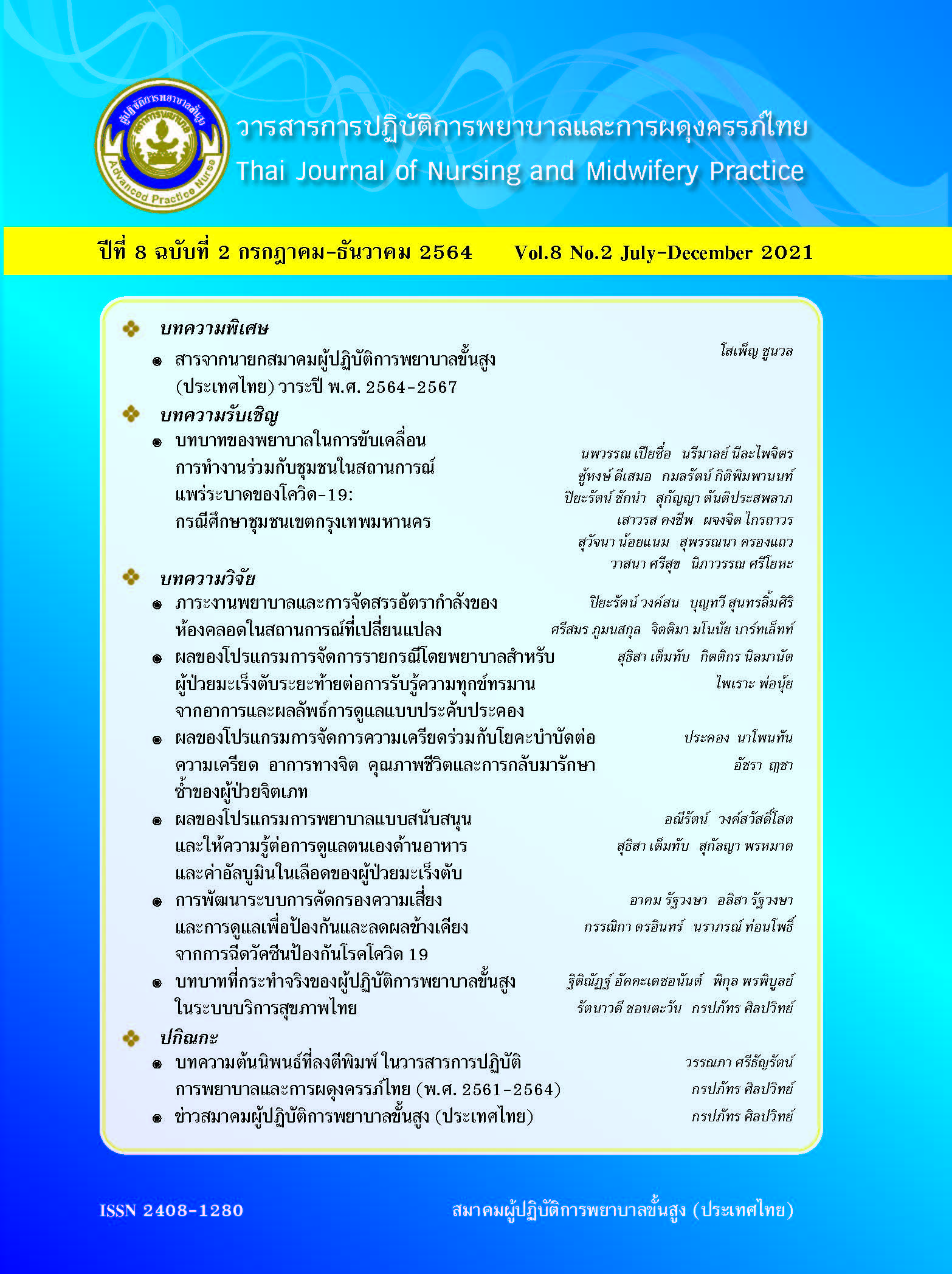Effects of the Educative Supportive Nursing Program on Dietary Self Care and Serum Albumin of Patients with Hepatocellular Carcinoma
Main Article Content
Abstract
Malnutrition frequently occur in patients with hepatocellular carcinoma (HCC) and it is a major cause of postponement of treatment. The aim of this two-group quasiexperimental research was to examine the effects of the educative supportive nursing program on the dietary self-care and serum albumin levels of patients with HCC. The samples were hospitalized patients with HCC admitted at the male medical units of a tertiary care hospital in Southern Thailand. Forty patients with HCC were recruited and equally random into the experimental group and the control group. The experimental group was engaged in the educative supportive nursing program. The control group received usual nursing care. Data were analyzed using paired t-test and independent t-test. Results showed that: (1) after receiving the program, the mean score of the dietary self-care of the experimental group was statistically significant higher than before receiving the program (t= -22.87, p<0.001); (2) after receiving the program, the mean score of the serum albumin of the experimental group was statistically significant higher than before receiving the program (t= -6.30, p<0.001); (3) after receiving the program, the mean score of the dietary self-care of the experimental group was statistically significant higher than the control group (t= -12.95, p<0.001); and (4) after receiving the program, the mean score of serum albumin level of the experimental group was not statistically significant difference when compared with the control group. The results showed that the program could help to improve the dietary self-care of patients with HCC. Further study should be conducted in a longer period
Downloads
Article Details

This work is licensed under a Creative Commons Attribution-NonCommercial-NoDerivatives 4.0 International License.
References
Sung H, Ferlay J, Siegel RL, Laversanne M, Soerjomataram I, Jemal A, et al. Global cancer statistics 2020: GLOBOCAN estimates of incidence and mortality worldwide for 36 cancers in 185 countries. CA Cancer J Clin 2021; 71(3): 209-49.
Globocan. Thai source: Globocan 2020. [Internet]. 2020 [cited 2021 Dec 15]. Available from: https://gco.iarc.fr/today/data/factsheets/
populations/764-thailand-fact-sheets.pdf
Cadier B, Bulsei J, Nahon P, Seror O, Laurent A, Rosa I, et al. Early detection and curative treatment of hepatocellular carcinoma: a cost-effectiveness analysis in France and in the United States. Hepatology 2017; 65(4): 1237-48.
Meekaew M. Efficacy of radiofrequency ablation (RFA) and transarterial chemoembolization (TACE) in the management of unresectable early and intermediate stages of HCC. J Depart Med Ser 2018;43(1): 69-73. (In Thai)
Shiozawa S, Usui T, Kuhara K, Tsuchiya A, Miyauchi T, Kono T, et al. Impact of branched-chain amino acid-enriched nutrient on liver cirrhosis with hepatocellular carcinoma undergoing transcatheter arterial chemoembolization in Barcelona Clinic Liver Cancer Stage B: A prospective study. J Nippon Med Sch 2016; 83(6): 248-56.
Silva M, Gomes S, Peixoto A, Torres-Ramalho P, Cardoso H, Azevedo R, et al. Nutrition in chronic liver disease. GE Port J Gastroenterol 2015; 22(6):268-76.
He JJ, Yin XX, Wang T, Chen MY, Li XL, Yang XJ, et al. Factors influencing postembolization syndrome undergoing first transcatheter arterial chemoembolization. J Cancer Res Ther 2021; 17(3): 777-83.
Walayat S, Martin D, Patel J, Ahmed U, Asghar M, Pai AU, et al. Role of albumin in cirrhosis: from a hospitalist’s perspective. J Community Hosp Intern Med Perspect 2017; 7(1): 8-14.
Crisan D, Procopet B, Epure A, Stefanescu H, Suciu A, Fodor A, et al. Malnutrition and non-compliance to nutritional recommendations in patients with cirrhosis are associated with a lower survival. World J Hepatol 2020; 12(10): 829-40.
European Association for the Study of the Liver. EASL clinical practice guidelines on nutrition in chronic liver disease. J Hepatol 2019; 70(1): 172-93.
Temthup S. Indicator report of advanced nurse practitioner, Nursing Service Division, Songklanagarind Hospital; 2018. (In Thai)
Orem DE. Nursing: Concepts of practice. 6th ed. Saint Louis: Mosby; 2001.
Taweebut P, Kerdmongko P, Amnatsatsue K. The effect of a supportive-educative nursing program for chronic disease patients with early stage kidney disease. J Pub Health Nurs 2017;31(1):129-45. (In Thai)
Phetcharat K, Ponglanga S, Kitisri C. Effects of supportive and educative nursing system program on self-care behaviors and blood pressure control among hypertensive patients. Nurs J 2018;45(1):37-49. (In Thai)
Srisatidnarakul B. The methodology in nursing research. 7thed. Bangkok: U & I Intermedia;2010. (In Thai)
Khongseua P, Tantikosoom P, Ua-Kit N. The effects of educative supportive nursing program on dietary behaviors among patients after percutaneous transluminal coronary intervention. Kuakarun J Nurs 2014; 21(supple): 168-85. (In Thai)
Polit DF, Beck CT. Nursing research: generating and assessing evidence for nursing practice. 8thed. Philadelphia: Wolters Kluwer Health/Lippincott Williams & Wilkins; 2008.
Li YF, Zhang LX, Xiao X, Liao HY, Wang J, Tang XL. Multimodal nutrition education for cancer patients. J Nutri Onco 2021; 6(2): 57-63.
Pamungkas RA, Chamroonsawasdi K, Vatanasomboon P. A systematic review: family support integrated with diabetes self-management among uncontrolled type II diabetes mellitus patients. Behav Sci (Basel) 2017;7(3):62. doi:10.3390/bs7030062.
Suh SR, Lee MK. Effects of nurse-led telephonebased supportive interventions for patients with cancer: A meta-analysis. Oncol Nurs Forum 2017;44(4):168-84.
Rerkluenrit J, Khwanchai P, Soiorn T. Effects of a supportive educational program on functional status and self-care of persons with heart failure. Rama Nurs J 2012;18(1):102-18. (In Thai)
Suttithum W, Wittayapun Y, Kalampakorn S. Impact of a specially designed self-care programme on selfcare behaviour and the A1c haemoglobin level in type-2 diabetes patients at Laan Saka Hospital. Thai J Nurs Council 2016;31(1):19-31. (In Thai)


